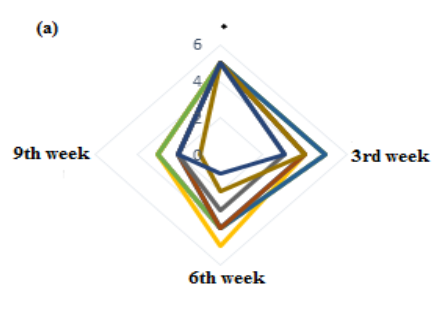 |
|
The effect of extracted sodium alginate (SA) (0.25, 0.50, 0.75, and 1.00% w/w) from Sargassum angustifolium along with sorbitol (S), glycerol (G), and before and after calcium chloride (CaCl2) treatment as a coating material were evaluated on oxidative stability, fungal growth, and sensorial properties of Persian walnut Juglans regia.In the second month of the storage period, peroxide and acid values of alginate-Ca2+ coated walnuts decreased compared the uncoated sample. Moisture loss was reduced, and the color parameter values were significantly higher in these samples than in uncoated ones (9th week). The fungal growth rate decreased by about 1.5-5.0 Log CFU/g in coated walnuts during the ninth week of storage. SA was an excellent protective barrier to water vapor and oxygen permeability to preserve walnuts against oxidative stress and fungal growth. In addition, SA as a coating material increased oxidative stability and decreased fungal spoilage of walnuts without any adverse changes in their color or sensorial acceptability.
Keywords: Sodium alginate, Persian walnut, Juglans regia L., oxidative stability, fungal growth.
|
|
 |

